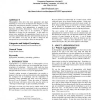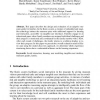1261 search results - page 146 / 253 » Adaptive brain-computer interface |
BCSHCI
2007
15 years 3 months ago
2007
Ethnographies often show that users appropriate and adapt technology in ways never envisaged by the designers, or even deliberately subverting the designers’ intentions. As desi...
96
Voted
COLING
1996
15 years 3 months ago
1996
Our main motivation is to build general and adaptable linguistic tools and we have faced the problem of their portability. We first make a quick description of the linguistic tool...
122
click to vote
ICA
2010
Springer
15 years 2 months ago
2010
Springer
SMALLbox is a new foundational framework for processing signals, using adaptive sparse structured representations. The main aim of SMALLbox is to become a test ground for explorati...
111
click to vote
ECTEL
2009
Springer
15 years 3 days ago
2009
Springer
Abstract. This paper describes the design and evaluation of an adaptive museum guide for families. In the Kurio system, a mixture of embedded and tangible technology imbues the mus...
127
click to vote
HCI
2009
15 years 3 days ago
2009
Abstract. Operators on naval ships have to act in dynamic, critical and highdemand task environments. For these environments, a cognitive task load (CTL) model has been proposed as...


